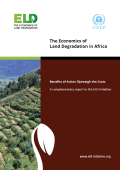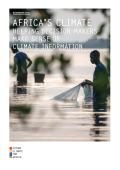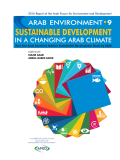
Land degradation and desertification are among of the world’s greatest environmental challenges. It is estimated that desertification affects about 33 % of the global land surface, and that over the past 40 years erosion has removed nearly one-third of the world’s arable land from production. Africa is particularly vulnerable to land degradation and desertification, and it is the most severely affected region. Desertification affects around 45 % of Africa’s land area, with 55 % of this area at high or very high risk of further degradation.

African decision-makers need reliable, accessible, and trustworthy information about the continent’s climate, and how this climate might change in future, if they are to plan appropriately to meet the region’s development challenges. The Future Climate for Africa report, Africa’s climate: Helping decision-makers make sense of climate information, is designed as a guide for scientists, policy-makers, and practitioners on the continent. The research in this report, written by leading experts in their fields, presents an overview of climate trends across central, eastern, western, and southern Africa, and is distilled into a series of factsheets that are tailored for specific sub-regions and countries. Some of these capture the current state of knowledge, while others explore the ‘burning scientific questions’ that still need to be answered.
The report aims to examining and documenting the role and significance of various enabling measures that could facilitate a smooth transition to an inclusive green economy in Africa, taking into account the implications of such a transition for the region. The measures examined are: policies and institutions, policy instruments, technology development and transfer, capacity development, and financing the transition.
The report (i) Analyses the implications of the transition to an inclusive green economy for Africa; (ii) Explores measures as they relate to the transition, and analyses trends in the application of the measures; (iii) Discusses challenges and opportunities for an inclusive green economy transition in Africa; and (iv) Puts forward policy recommendations that could enhance the adoption of enabling measures relevant for a smooth transition in Africa.
For more than a decade, African economies have achieved impressive and sustained growth. In 2014, growth rates averaged 3.9 per cent – only East and South Asia grew faster, at 5.0 per cent. However, this growth can be described as largely non-inclusive because of its limited contribution to job creation, broad participation and overall improvement to people’s living standards.The challenge facing Africa is not only how to maintain such rapid growth, but how to translate it into sustained and inclusive development based on economic diversification that creates jobs, contributes to reduced inequality and poverty rates, enhances access to basic services, and corrects market failures that undermine environmental sustainability. This report is to promote understanding and the adoption of inclusive green economy policies that foster sustainable structural transformation in the region.

This AFED report on "Sustainable Development in a Changing Arab Climate" recommends an alternative approach, based on integrating sustainable development principles within the anticipated rebuilding efforts. It calls upon local, regional, and international aid organizations not to limit their efforts to providing safety and basic necessities to those affected, but rather to use the relief plans as a launch pad for promoting new approaches to development, rooted in a transition to green economy.
This report, on prospects and challenges on the path towards achieving the SDGs, builds on the previous eight reports on the state of Arab environment, produced by the Arab Forum for Environment and Development (AFED) since 2008. AFED annual reports have so far addressed major development issues in the Arab region, including Water, Food Security, Energy, Green Economy, Ecological Footprint, Sustainable Consumption, and Climate Change. The report highlights the policy options available for the Arab countries to realize the Sustainable Development Goals by the 2030 target set by the United Nations, in light of the new political, economic, and social developments.
